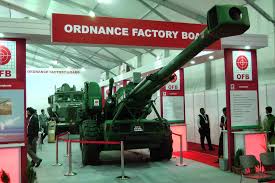Pending Conciliation Settlement, Continuing With Corporatization Of OFBs A Clear Violation Of ID Act 1947 – Opine Legal Experts

Many of our readers have now started raising questions about the dispute between the Federations of Trade Unions of Defence Civilian Employees and the Department of Defence Production as the Employer. The Government of India in violation of the previous agreements and assurances with the Federations have taken a decision on 16/05/2020 to convert the 220 years old Indian ordnance Factories in to a single or multiple corporations. From that day onwards, employees and Trade Unions are fighting against this move.
Even during the COVID-19 Lockdown period many agitations were held. Many MPs also raised the issue in the Parliament. Many political parties have issued statement against Corporatisation of Ordnance Factories and its anticipated privatization in due course of time. The Federations (AIDEF, INDWF & BPMS) jointly issued a strike notice for indefinite strike from 12/10/2020. The government initially attempted to face the strike with its powers in hand. Steps were also taken to impose ESMA. The Ordnance Factories even though no direct connection with public was declared as public utility service. However the Government in its wisdom approached CLC(C) and the CLC(C) in accordance with the Provisions of ID Act 1947 held conciliation proceedings jointly with Ministry of Defence and Federations. A settlement was reached 09/10/2020 and the relevant portion of the settlement is given below :-
It is agreed by both the parties that in respect of strike demands dated 04/08/2020, during the pendency of ongoing conciliation proceedings, the Employer will abide by the provisions of Sec. 33(1) of the Industrial Dispute Act 1947 and Unions will not proceed on proposed strike from 12/10/2020.
Provision of Sec.33(1) of ID Act 1947 is also given here :-
S.33. conditions of service etc. to remain unchanged under certain circumstances during pendency of proceedings – (1) during the pendency of any conciliation proceeding before conciliation officer or a Board or of any proceeding before (an arbitrator or ) a Labour court or Tribunal or National Tribunal in respect of an Industrial dispute, no employer shall
(a) in regard to any matter connected with the dispute, alter, to the prejudice of the workmen concerned, in such dispute, the conditions of service applicable to them immediately before the commencement of such proceeding; or
(b) for any misconduct connected with the dispute, discharge or punish, whether by dismissal or otherwise, any workmen concerned in such dispute
On the one side the Secretary(DP) is holding dialogue with the Federations and on the other side the govt. is going ahead with its decision to convert the Ordnance Factories in to a corporation. Consultant is appointed and they are also in the process of submitting their report. A meeting of the EGOM has also taken place on 02/03/2021 and on the same day the 80,000 strong employees took a pledge that they reject Corporatisation of OFB and that their service as a Central Govt. employee/Defence Civilian Employee cannot be altered by the Government. So far the EGOM chaired by Rajnath Singh has not met the Federations. The issue has now become serious after Puneet Agarwal, Joint Secretary in the Department of Defence Production issued a letter to the Principal Controller of Accounts(Fys.) directing him that his office should not delay the closing of the Financial year ending 31/03/2021, since the final commercial accounts of the OFB (Unit Wise) is urgently required. They should not take normal 3 to 4 months time for finalizing the commercial accounts. The reason given in the letter is that the Cabinet Committee on Security has accorded approval to convert OFB in to one or more than Corporate entities to be registered under the Companies Act 2013.
After the issue of the above letter, it has become clear that irrespective of the pending conciliation proceedings, the Govt. will go ahead with its decision and issue the notification very soon. Now comes the question whether the Govt. is violating the conciliation settlement reached in the presence of CLC(C). the Federations have already written several letters to the DDP and the Defence Minister protesting against the violation of the conciliation settlement. We approached some of our eminent legal personalities and asked their views on the present situation, whether the Federations are correct in protesting that govt. is violating the conciliation settlement and also Sec.33(1) of the ID Act 1947. Even though they asked for little time for studying the entire matter, their immediate legal opinion is that govt. as a model employer cannot violate such an agreement by quoting some technicalities like policy decision of the govt. etc.
When an Industrial dispute is pending before an authority under the ID Act 1947 the general understanding that such dispute should be conciliated or adjudicated upon by the authority in a congenial atmosphere and not to create any bitterness, unpleasantness and unrest. To achieve this objective only a ban has been imposed on the Employer by the ID Act 1947. Broadly speaking Sec,33(1) of the ID bars alteration in the conditions of service “prejudicial” to the workmen concerned in the Dispute. Moreover if the conciliation officer charged with the duty of bringing about a settlement in the Dispute is not able to do that then only a Tribunal can give its Award deciding about the dispute referred to it. In the present case the conciliation has not yet been concluded. The government as a model employer should have referred the case for adjudication to an appropriate Industrial Tribunal and await for its decision on the three disputes raised by the Federations in their strike notice. That should have been a fair approach on the part of the government.
In any case legally we have our doubts that when the conciliation is proceedings has not come to its natural conclusion, how government can go ahead with its decision to implement Corporatisation of Ordnance Factories. Government may argue its decision is a policy matter of the democratically elected government and the workers have got no authority to challenge it. How far this argument will legally sustain is an issue to be debated. The employees argues that they are appointed as Central Govt. Employees and Defence Civilian Employees and no where in their appointment contract it is written that at any point of time Government will change their status as a Corporation employee. They argue it is a clear violation of various constitutional provisions, such as Articl-14, 16, 21, 309, 310 & 311. There is weightage in their argument. Government has got every right to take a policy decision, but that cannot be violating the constitutional guarantee provided to the employees. Their dispute is that if the status of OFB is converted in to a corporation their status as Govt. Employee will go away, which the government cannot do, since it will be a clear violation of the Contract of Appointment. Government may quote the eg. Of BSNL & SPMCIL, which were previous Government Departments and subsequently converted to Corporation/Public sectors. Government should not forget in both the cases there was an agreement signed between the employees represented by their Trade Unions and the Government as an Employer. In the case of Ordnance Factories there is no such agreement so far. Therefore the employees will have a strong case if the Government issues a notification pending the conciliation.
In the case of the employees of Ordnance Factories, the Employer is also Government of India and the “appropriate Government” for referring the dispute to the Industrial Tribunal is also the same Government Of India. How can Government of India can play the role of both the petitioner and Judge. Therefore if the government wants to be fair towards its own employees, the better option is to keep its Corporatisation decision in abeyance and refer the matter for adjudication. A 220 years old organization can wait for some time and a judicial decision will be fair on both the parties, so that there is no Labour unrest and bitterness in a vital and strategical defence industry.




